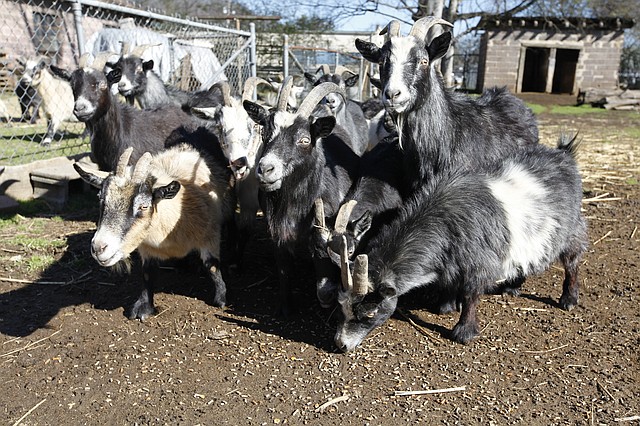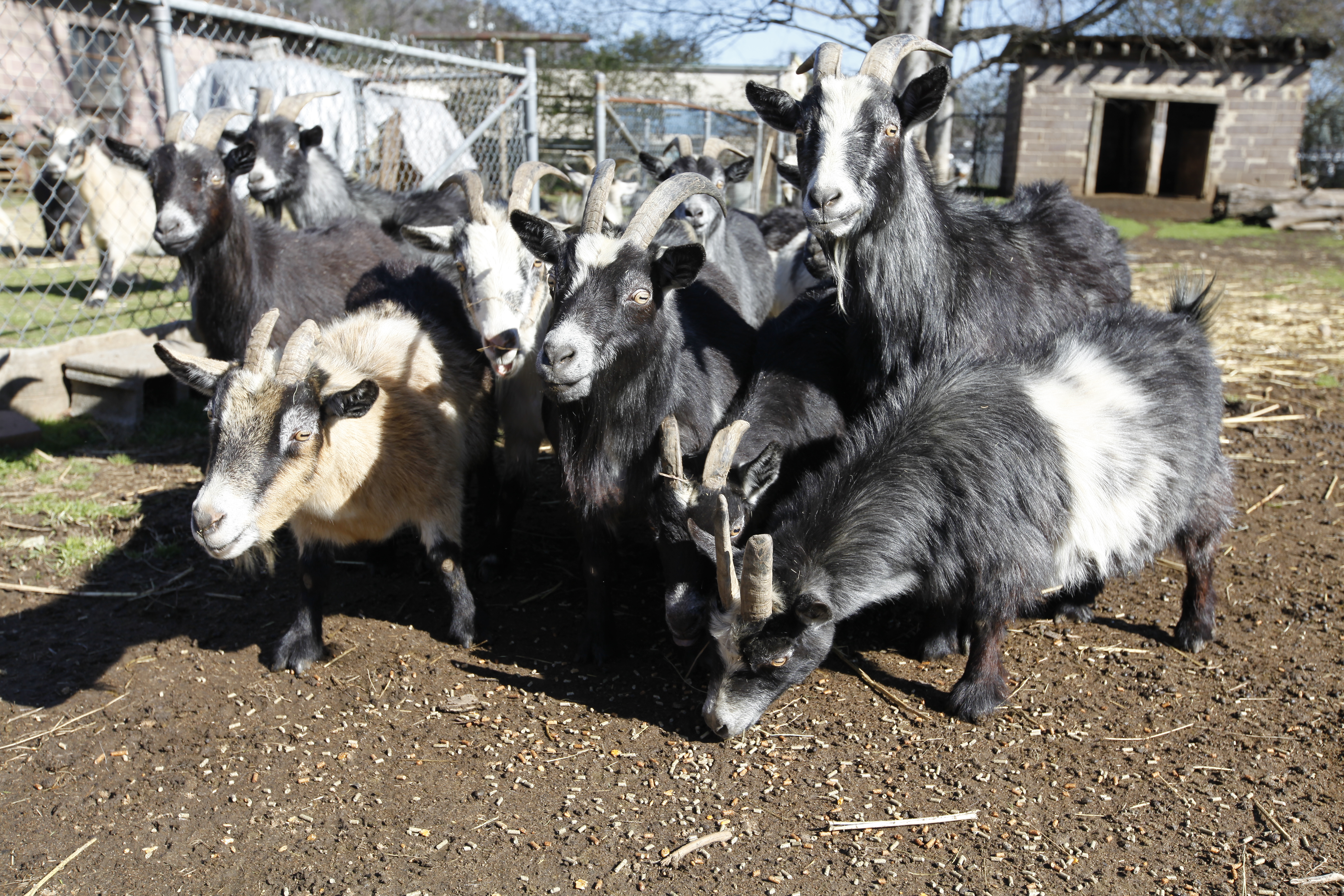Soddy-Daisy City Commission drawn into family feud over livestock
Friday, January 1, 1904
WHAT'S NEXTThe Soddy-Daisy City Commission is scheduled to vote on a new livestock ordinance Thursday.
Inside a chain-link fence along Morningside Drive in Soddy-Daisy, 22 plump pygmy goats spend their days munching on grass and hay, wholly unaware they are at the center of a drama that has enveloped a family, a neighborhood and now a city commission.
They have no conception of the ordinance Soddy-Daisy's attorney has spent hours drafting because of them. They have no clue that a group of commissioners will be voting on their fate Thursday.
They do not know they are one of the reasons why siblings Brenda and Cecil Smith haven't spoken to each other for months -- despite living right across the street from each other.
How could they know all that? They're just goats.
But they're not just goats to the sister who owns them and the brother who wants them gone. To Brenda, 65, they are her "babies." To Cecil, 72, they are a neighborhood nuisance that threatens to lower his property value.
To the Soddy-Daisy City Commission, they are one of the complicated byproducts of the city's transition from rural community to residential suburb.
According to current city code, those living in Soddy-Daisy's city limits may keep only eight goats per acre of land.
Cecil and Brenda lived on the block at Morningside Drive long before the code was written in 2005. They and their two other siblings were raised there in a home their parents built when Cecil was a year old.
"My parents were survivors," says Cecil. "What we ate, we worked for."
Both Cecil and Brenda helped their parents tend the chickens and milk the cows, but Brenda could never think of the animals as anything other than pets. She could never bring herself to kill a chicken, and she cried when her father traded the cows she had grown attached to.
"Even the ones we had for food, I always took them for pets," she said. "I cried whenever we sold one or one died."
Their mother, as she grew older, became fond of pygmy goats and asked Cecil to buy her some in 1998. He agreed, and soon a small herd lived in the backyard.
Though their mother has died, Brenda still treasures the goats. She calls each by name: Bambi, Katie, Tinkerbell, Precious. When she refers to them as a group, she doesn't call them goats or animals; she calls them "babies."
She held each when it was born, and sat and rocked them when they were small.
"Every time I walk to that window in the morning, I watch them. ... I don't know, it's kind of comforting to me."
Along with the goats, Brenda takes care of five stray cats and two dogs. They are like her family, because she lives alone.
Cecil says he's an animal lover, too. He dotes on a tiny dog named Little Bit and keeps corn and feed in his truck to give deer in the woods.
He also values family, he said. Photos of his children and grandchildren adorn his walls, and he fought to make sure his dad and uncle were given a public memorial for their military service.
But he can't tolerate the goats, he said, and he can no longer cooperate with his sister.
"I want to clean up this neighborhood, and she has just continued to make it junky," he said. "If she kept it clean and kept the goats in line, I wouldn't mind them. But there's no point reasoning with her."
CITY INTERVENTION
The City Commission became involved in the Smiths' saga in 2004. Cecil and a group of neighbors petitioned the city to intervene with Brenda's goats, which then numbered 24 and were constantly getting loose and roaming the neighborhood.
And they smelled bad, Cecil said.
That year, the commission approved an ordinance tailored specifically for Brenda: Removal by attrition. She could keep the goats, but she wasn't allowed to buy or breed any more. She was supposed to have the herd reduced to 16 by 2008, and to eight by 2011.
"The plan was for the goats to die off and, of course, the goats have not cooperated," summarizes City Commissioner Rick Nunley.
What to do with livestock on residential property is an issue Soddy-Daisy leaders say they've dealt with since the town was incorporated in 1969.
"Soddy-Daisy used to be a rural-residential-agricultural area," said Nunley. "As the population has grown and more subdivisions are built, it's become more of a bedroom community to Chattanooga."
Other households in town still keep chickens and cattle in their yards, Nunley said.
"People live closer to each other than they used to," Mayor Jim Adams said. "It means that we've got to take whole neighborhoods into consideration, not just what one household wants to do."
But the commissioners acknowledge they've never had to deal with complaints like the ones generated from Morningside Drive.
"It's not just neighbors. It's emotional. It puts the commission in a hard place," said Nunley. "We're not Judge Judy; we're a city commission. We've got 13,000 citizens in Soddy-Daisy that we've got to worry about."
Both Brenda and Cecil said that, at the end of the day, their dispute stretches beyond goats.
Brenda maintains that Cecil is acting out of long-held resentment toward her.
"If you do something to one of my animals, you can get to me, and he knows it," she said.
Cecil said he doesn't have a particular personal vendetta; he's just not willing to compromise.
"I've forgiven her for things in the past. I pray for her every night. But we don't have to be friends," he said.
ESCALATION
As the battle of the goats raged on last autumn, both Cecil and Brenda collected letters and signatures of neighbors in their camps.
"There are times my family and I cannot enjoy sitting on our front porch because of the odor these animals put off," wrote Bernadette Martin. "I have also have read some articles on goats where they carry some diseases that can be transmitted to humans and other animals."
Others wrote in Brenda's favor.
"We can honestly say the goats and the field do not produce any odor," wrote the Abernathy family. "Blessed be the goats!"
As the story drew more media attention, people started to tune in. Folks in town started calling Brenda "the goat lady," a name she took pride in.
Some took sides. In one local flower shop last week, two women playfully bickered about the issue.
"Those goats are just sweet as they can be!" one said.
"I don't care, they stink!" the other woman piped up from the back room.
"Just leave 'em alone! They're not bothering you!"
A REVISED ORDINANCE
At its Jan. 19 meeting -- where neighbors showed up with signs supporting the goats and at least one person bleated like a goat from the back row -- the commission voted to have city attorney Sam Elliott draft a new ordinance that would, in theory, allow Brenda to keep the goats.
"These are the first -- and the only -- goat-related ordinances I have ever had to draw up," joked Elliott, who drew up the 2005 ordinance.
Elliott said the new ordinance still is being tweaked, but explained it basically allows anyone who can prove that their livestock has been on their property for the last 10 years may keep them until the animals die out.
The commission will vote whether to ratify the ordinance at a Thursday meeting.
Adams is staunchly against changing the ordinance.
"I know she loves those goats, but I base my decision on what the ordinance says, not the emotion," he said. "You're either in compliance or you're out of compliance."
Cecil says the new law will be ineffective.
"How will they enforce it? Keep profile pictures of every single goat?" he said.


